Focus on Calcium
Focus on Calcium
We all know that calcium is good for our bones, but have you ever considered other ways this mineral may help support your running?
In this episode we delve into the consequences of suboptimal calcium status on running performance with a particular focus on muscle contraction. We also consider some of the risk factors for poor calcium status before highlighting several key dietary strategies to help optimise a daily intake of calcium.
SHOW NOTES
(03:13)
Calcium is a mineral that is well known to support bone and teeth. But did you know…..
- 99% of calcium is found in bone and teeth
- A maximum of 35% of ingested calcium is actually absorbed into the body
- Of the 35% absorbed approx. 50% is excreted via the kidneys
- Calcium is held in a reservoir within bone, from which the body draws it when required
(07:32)
Calcium has many functions within the body including:
- Regulation of hormonal release
- Transmission of nerve impulses
- Blood clotting
But the principle ones a runner would want to focus on include:
- Bone health
- Muscle contraction
- Vasodilation
- Vitamin D and its metabolism
- Biosynthesis of ATP (adenosine triphosphate - our energy currency)
(09:11)
Muscle Contraction is complex but put simply; each muscle fibre (or muscle cell) is made up of smaller fibres called myofibrils. These myofibrils contain even smaller structures called actin and myosin filaments. It is these filaments (actin and myosin) that slide in and out between each other that form the muscle contraction. Calcium is crucial to activating this muscle contraction cycle. If there is insufficient calcium available then the muscle contraction cycle slows and the muscle becomes fatigued really quickly.
(14:11)
The hormones Calcitonin and Parathyroid hormone (PTH) alongside the pro-hormone Vitamin D are very important for maintaining blood serum Calcium balance (homeostasis).
- Calcitonin helps build born when there's sufficient calcium available
- PTH stimulates bone demineralisation when blood calcium levels are low
- Vitamin D encourages absorption of calcium from the digestive tract when directed by PTH
The kidneys are also important in maintaining Calcium balance. When stimulated by PTH, they will increase the reabsorption of Calcium, thus less is excreted.
Calcium plays an important role in the REGULATION of the energy cycle by activating various enzymes to produce ATP and as we know ATP is important within the muscle contraction cycle.
(20:00)
Thinking about the runner; if calcium levels are insufficient then it could lead to incomplete muscle contraction and early fatiguing of muscle. It may also increase the runner’s risk of developing a stress fracture, which could remove them from running for at least 12 weeks to recover.
(23:16)
FEMALE FACTORS:
- It is thought that a low vitamin D and Calcium status could MODESTLY increase the risk of a woman moving into early menopause….so something to bear in mind for all our listeners who are pre-menopause.
- A low vitamin D and Calcium status is thought to be associated with female conditions such as PCOS, PMS, and Endometriosis. Studies suggest this may be because the ovaries are a target organ for Active vitamin D3 PLUS Vitamin D3 receptors are found on ALL reproductive tissue. Studies that have supplemented Ca have found a positive correlation in the reduction of early menopause.
- Females who are vegetarian or vegan may be at an even greater risk if they are not actively monitoring their Ca AND vitamin D intake.
(27:56)
There are several potential risk factors for suboptimal calcium levels, some of which are within our control and others that are outside of our control. Examples include:
- Age
- Sweat rate
- Diet
- Medications
- Nutrient depletion
- Health conditions/illness
(35:00)
Suboptimal levels of calcium don't always produce symptoms initially, but as the insufficiency develops then symptoms will become apparent. These may include:
- Muscle aches, muscle pain, spasms, and cramps.
- Tiredness and fatigue
- Tingling and numbness generally in the arms or the hands, and the legs or feet and around the mouth Irregular heartbeat
- Dry scaly skin
- Coarse hair that breaks easily.
But remember, many of these symptoms could be associated with other nutrient deficiencies, so testing would be recommended to ensure the primary cause is being addressed.
(38:35)
There are several nutritional interventions that could be considered to help reverse low Calcium status and encourage optimal levels. These include:
- Dairy products (but in moderation). Consider using sheep and/or goat dairy products or dairy alternative products
- Green vegetables including broccoli, kale, spinach
- Beans/peas e.g red kidney beans, chickpeas
- Nuts and seeds – especially sesame seeds and almonds
- Olives
Some of these foods, especially green leafy vegetables contain oxalates so cook them before eating.
(45:00)
KEY TAKEAWAYS:
1) Calcium is classed as a mineral of which 99% is found in bone and teeth, only 1% is found in blood serum
2) A maximum of 35% of the calcium we ingest is absorbed from the GI tract and of the 35% absorbed…approx. 50% is excreted via the kidneys….so an optimal daily intake of calcium is essential to help maintain appropriate circulating levels to help prevent the leaching of it from bone
3)Calcium has MANY functions in the body, however the key ones for a runner include:
- Bone support - strength/structure and function
- Energy production – Ca helps regulate ATP production
- Muscle contraction – Ca initiates the contraction cycle
4) Although vasodilation i.e. the widening of blood vessels would also be importantThere are several ways the body controls calcium levels in bone and blood:
- Via the hormones calcitonin and parathyroid hormone – calcitonin absorbs Ca into bone whilst PTH leaches it from bone
- Via vitamin D and the absorption of calcium from the GI tract
- Via the kidneys – which controls how much Ca is excreted or reabsorbed.
PTH is the master controller of vitamin D and the kidneys actions on Calcium
The thyroid gland controls Calcitonin synthesis and function
5) Some symptoms that may suggest Ca levels are suboptimal include:
- Muscle aches/pain/spasms/cramps – these are the earliest signs
- Tiredness/Fatigue
- Tingling and numbness in arms, hands, legs, feet and also around the mouth.
But there are many more and remember, many of these symptoms are also associated with other nutrient deficiencies, so best to test to ensure you are addressing the primary cause.
6) There are many risk factors for low calcium levels, some of which are outside our control and some that are within our control. Examples include:
- Age
- Diet
- Sweat rate
- Medication
7) Finally, there are many foods that contain Ca….it is not just dairy products. Examples include:
- Broccoli, kale, spinach, rocket and other leafy greens
- Red kidney beans…plus other beans and pulses e.g. chickpeas
- Nuts and seeds – esp sesame seeds and almonds
- Olives
But remember some foods contain oxalates that may inhibit Ca absorption, but they can be disarmed by boiling or steaming the foods
8) Finally, finally, as long as you are healthy and you keep your meals healthy and varied it is possible to achieve your daily Ca needs via the diet, even if you are vegetarian or vegan.
Related Episodes:
Ep21 Bone health For Runners Part 1
Ep24 Bone health For Runners part 2
Disclaimer:
The suggestions we make during this episode are for guidance and
advice only, and are not a substitute for medical advice or treatment.
If you have any concerns regarding your health, please contact
your healthcare professional for advice as soon as possible.
Aileen Smith and Karen Campbell met at as nutrition students (Institute for Optimum Nutrition, London) and became lifelong friends and nutritional buddies! Both have a love of running and a passion for nutrition, delicious food and healthy living.
Together they host RUNNERS HEALTH HUB. A place for like-minded runners who are looking for simple ways to support running performance, energy, endurance, and general great health.
We are excited to be able to share our expertise, experience and short cuts with you. We hope you'll join us again. If you'd like to know more about us and She Runs Eats Performs please check out our TRAILER.
If you're ready to make learn more about how you may introduce easy nutrition into your running and training plan join our Easy Nutrition For Healthy Runners Online Programme for short videos, recipes, downloads and LIVE training and Q&A.
As a THANK YOU to you as one of our valued listeners, we have a special offer for you use COUPON CODE POD to get 33% discount off the full price which brings the price to £199.
If you’d like help from Karen and Aileen to design a personalised sports nutrition plan for your running - please contact them at hello@runnershealthhub.com
Happy Running!
Aileen and Karen

